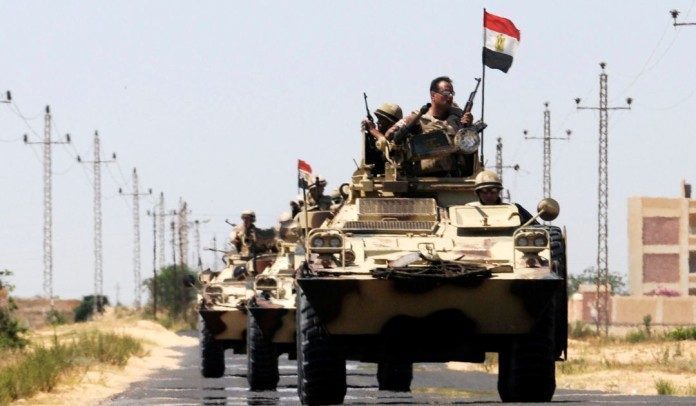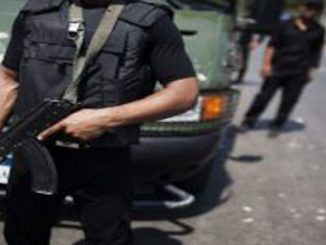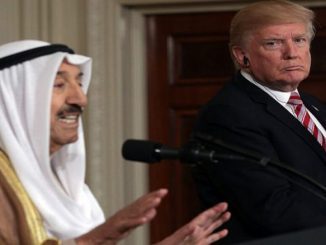
In the context of his keenness to have full control of the military institution, Egypt’s Abdel Fattah al-Sisi keeps harassing army officers and conducting frequent changes in the ranks of military commanders so that none of them would be able to create a power center within the army.
At the same time, Sisi is keen to exert greater influence on the Egyptian state with respect to various media, political, economic and security aspects. To this end, all efforts of the military intelligence, the general intelligence service, and the army’s moral affairs authority are mobilized to achieve Al-Sisi’s internal control. In addition, Sisi is strengthening his control over the State’s administrative and control apparatuses by appointing military commanders as governors and heads of various administrative and control authorities.
Decline in Egyptian Army’s global ranking
While Sisi is preoccupied with imposing his influence and control over the Egyptian state, he has not given due attention to improvement of the army’s operational and training efficiency. Therefore, “Instability continues to plague Egypt, centered on extremism within its borders as well as neighboring instability,” according to Global Fire Power (GFP).
The Egyptian army has appeared in US-based military analysis Global Fire Power’s 2018 review of 136 world armies as the 12th. on the world ranking, dominated by the United States and Russia, holding respectively the first and second ranks. Egypt was ranked 10th. in 2017 after a wave of multi-billion dollar arms deals with several countries. In this regard, Egypt has become one of the largest arms buyers in the world over the past five years; as the regime concluded arms deals with the United States, Russia, France, Germany and others despite its economic crisis, according to the report of the Stockholm International Institute for Peace Research (CIPRI) – which controls the world’s arms sales and purchase – ranking third after India and Saudi Arabia. The United States, Russia, China, India and France ranked top five on armies’ global ranking, while Britain, North Korea, Japan, Turkey and Germany occupied the following positions respectively.
In its assessment, the Global Fire Power criteria rank armies based on more than 50 factors, including each country’s military budget, its manpower, the amount of equipment each country has in its respective arsenal and its natural resources.
One of the main factors that led to the decline of the Egyptian army ranking according to Global Fire Power is the training factor. Although the Egyptian army has recently joined several military exercises, most prominently the Protectors of Friendship-2016, 2017 exercises with the Russian army and the Bright Star-2017,2018 exercises with the US army, as well as participation in joint exercises with other countries, however the military units that joined these exercises were limited – including only 3 infiltration anti-terror battalions, known also as task forces: Unit 777, Unit 888, and Unit 999, while the troops of the second and third field armies as well as forces of various military zones were excluded from participation. According to the Global Fire Power’s ranking criteria, assessment of armies includes military exercises to forces from different formations, not small military units (task forces) that usually perform qualitative operations.
Among the factors that led to the decline of the Egyptian army in the Global Fire Power ranking is the reduction of the geographical area of the Egyptian State; some believe that the Egyptian regime’s waiver of the Red Sea islands of Tiran and Sanafir to Saudi Arabia is one of the reasons behind reducing the geographical area of the Egyptian State.
Osama Suleiman, former member of the Egyptian Parliament’s National Security and Defense Committee says, “The global ranking of the Egyptian Army is likely to continue declining next year (2019) due to presence of the same factors that were behind its decline this year.” He pointed out that “Among these factors, the GFP index includes assessment of the economic situation of the State itself and not only the army, which is a serious indicator; and therefore it affects the ranking of the Egyptian army among world armies due to the bad Egyptian economic situation that affects its ability to launch wars.” Suleiman also ruled out that the performance of the army in Operation Sinai-2018 against militants in the Sinai Peninsula was among the factors that led to the decline of the Egyptian army global ranking.
He added: “On the other hand, the Global Fire Power ranking depends on the local military industries; the more the State manufactures its own weapons, the higher its ranking becomes. For example, Turkey (which came in the 8th position) mostly manufactures its needs of equipment and ammunition, while Egypt (which came in the 12th position) imports large quantities of equipment and spare parts.” “There are other negative factors that affect the strength of armies, such as the democratic situation, the human rights situation, and the military doctrine of the army,” Suleiman pointed out.
Continued restructuring within the military to ensure loyalty
A- New Commander of the Republican Guard Forces
Since the appointment of Lt. General Mohamed Zaki as Defense Minister on 14 June 2018, the name of the commander of the Republican Guard forces who succeeded “Zaki” remained unknown for some time. But recently, media reports have indirectly revealed the name of the new Republican Guard commander, i.e. Major General Ahmed Ali.
Major General Ahmed Ali was appointed as the commander of the infantry corps, one of the most important branches of the Egyptian armed forces, in the comprehensive reshuffle that took place within the armed forces on June 10, 2015, and remained in this position for three years until June 14, 2018, when he was appointed as commander of the Republican Guard forces. The appointment of the commander of the Republican Guard from the infantry corps is a regular custom within the Egyptian army; as the majority of those who took over as Republican Guard commanders had served as infantry troops commanders before.
B- Arrest campaign among army officers
Press reports have revealed that there is an arrest campaign against Egyptian army officers who attempted to express their sympathy with the Syrian revolution and criticized Syrian President Bashar al-Assad for killing his own people. Also, these officers were reportedly against participation of Egyptian forces in the expected battle of Idlib. There are reports that senior military commanders in the Egyptian army ordered investigations on army officers whose pages on the social networking sites contained criticism of the Syrian president or sympathy with the Syrian revolution. These reports later affirmed that those officers were arrested and placed in solitary cells inside their military units. Activists on the social media circulated a list of names of a large number of Egyptian army officers (20 high-ranking officers) who have recently been arrested in mysterious circumstances under a high level of discretion. However, the Egyptian Institute of Studies could not confirm authenticity of these reports.
On the other hand, confidential sources told the Egyptian Institute of Studies that during the past period, the military intelligence summoned some officers for investigation and forced them to apply for early pension so that they can get their full privileges and financial rights after quitting their service. The sources said that the military investigations with these officers proved that they have relatives of the first and second degree that are related to Islamic trends; and that some of these officers have religious tendencies. Sources said that these officers were investigated by the military intelligence in June, July and August 2018.
C- Reports about dismissal of military intelligence director
Frequent reports have been circulated about the sacking of the director of military intelligence, Major General Mohammad Farag al-Shahat, and the appointment of Maj. Gen. Khaled Megawir, the commander of second field army as the new military intelligence director. Adel Al-Adawi, director of the International Economic Forum in Egypt, said on his Twitter account that he had received exclusive information that Al-Shahat had been fired and replaced by Megawir. Al-Adawi said that he would later publish more details about these reports, without giving further details.
However, the dismissal of Maj. Gen. Mohammed Farag al-Shahat from his post as director of the military intelligence has not yet been confirmed as these reports have only been published by Adel al-Adawi, who is said to be close to the Egyptian military institution and presidency.
D- A new GIS chief of Palestinian affairs
Egypt’s director of the General Intelligence Service (GIS), Major General Abbas Kamel, has issued a decree appointing Major General Ahmed Abdel Khalek as the agency’s chief of Palestinian affairs. Abdel Khalek will be replacing Major General Sameh Nabil. The Egyptian official, the sources added, has started communications with the leaders of the Ramallah-based Palestinian Authority (PA) and the Hamas movement in the Gaza Strip and has invited them to meet with intelligence chiefs in Cairo. The decision comes following Nabil’s failure to achieve the reconciliation between the PA and Hamas. Major General Ahmed Abdel Khaliq had played an important role in implementing the Shalit Swap between Hamas and Israel, which was overseen by Egypt’s General Intelligence Service. The latest visit by Major General Abdel Khalek to the Gaza Strip was on September 22, 2018. An Egyptian security delegation had arrived in the Gaza Strip through Beit Hanoun crossing (Erez), in northern Gaza Strip, to discuss Palestinian reconciliation with the Hamas leadership. “The Egyptian security delegation arrived in the Gaza Strip and included the official in charge of the Palestinian file in the Egyptian intelligence service, Major General Ahmed Abdel Khalek, and the Egyptian consul to Palestine, Abdullah Shehateh,” the information office of the Beit Hanoun crossing said. Abdel Khalek had arranged a meeting between the delegations of Fatah and Hamas on the one hand and the director of the General Intelligence Service, Major General Abbas Kamel, on the other; and he is reportedly arranging another meeting between them in the near future.
Continued militarization of the State
a- Maj. Gen. Saif al-Din appointed head of ACA
On Thursday, 6 September 2018, the Official Gazette published Presidential Decree No. 412 of 2018 appointing Major General Sharif Saif al-Din Hussein Khalil – former commander of the Infantry Corps, succeeding General Ahmad Ali, who took over as commander of the Republican Guard Forces – as head of the Administrative Control Authority (ACA) for one year from 30 August 2018. Before he became commander of the Infantry Corps, Saif al-Din had served as commander of the Southern Military Zone and member of the Supreme Council of the Armed Forces (SCAF).
The Administrative Control Authority (ACA) was established in 1964 as an independent organization affiliated to the Prime Minister. The ACA is basically responsible for detecting as well as fighting corruption in the government, public business sectors and private sector accomplishing public work. Further, the ACA is responsible for ensuring the implementation of enforced laws, applied regulations and systems.
According to the Law 54/1964, the ACA is authorized to:
– Study and reveal causes of negligence in work and production and suggest means to avoid it and ensure that applied laws are adequate to achieve the goals.
– Follow-up the implementation of laws decisions and regulations.
– Reveal the defects in the administrative, technical and financial systems.
– Detect and prevent administrative and financial violations and tendencies to abuse authority.
– Examine the published media reports concerning deficiency in work or abuse of authority.
– Seize public fund crimes committed by public servants.
– Examine citizens’ complaints.
– Conduct investigations on candidates for top management posts or candidates to be decorated.
– Submit reports to the Prime Minister.
* The ACA exercises its powers specified in the Law in the following areas:
1- The administrative apparatus of the state.
3- The public business sector.
4- The public bodies and institutions.
5- The public and private societies.
6- The private sector that carries out public works.
7- The entities in which the State contributes.
According to the law 54/1964 ACA members have the authority to:
1- Examine of documents & files however confidential they are.
2- Obtain copies of the documents and files.
3- Demand the presence of officials & citizens to hear their statement.
4- Request the suspension or the punishment of public employees.
5- Conduct investigations, collect evidence, search for suspects and arrest them.
6- Conduct investigations on candidates for top management posts or candidates to be decorated.
7- Provide reports to the Prime Minister, Ministers, and Governors with any required studies, information and data.
8- Submit reports including results of studies and remedial proposals to the P.M, Ministers and State Officials.
Major General Sherif al-Din had served as commander of the Southern Military Zone and member of the Supreme Council of the Armed Forces (SCAF), before he became commander of the Infantry Corps, which he has recently quitted to serve as head of the Administrative Control Authority. Some believe that Sisi’s decision to appoint Saif al-Din in this position to have full control of this important organ, as happened when he had appointed the head of his office, Maj. Gen. Abbas Kamel, as director of the General Intelligence Service.
b- Military intelligence’s control over Egyptian media
In a new episode of the Egyptian military’s control over the media, a statement by a group of Egyptian journalists related to “Egyptian Media Group”, a conglomerate of all types of media; print, broadcast, and digital, owned by Eagle Capital, a privately managed, state-owned investment firm and creator of sovereign wealth headquartered in Cairo, reported that Eagle Capital has financially acquired the DMC channel and ANA news agency. However, Tamer Morsi, board director of the “Egyptian Media Group”, denied these reports on his Facebook account. Earlier this month, informed sources said that “D Media Group”, owner of the DMC channel – run by the military intelligence and directly overseen by the presidency, has already acquired most shares of the Future Media Group, which owns Egypt’s Capital Broadcasting Center (CBC) network, owned by businessman Mohamed Al-Amin.
Egyptian Media Group previously owned only 30 percent of the CBC network. The Egyptian Media Group has recently acquired a number of prominent investments in the media sector, including the TV channel “ONTV”, founded by business tycoon Naguib Sawiris. It has also acquired 51 percent of Presentation Sport company, 70 percent POD for public relations and media marketing, and 50 percent of Misr Cinema. The group also owns investments in Egyptian IT Company, which operates in the field of information technology.
c- New intelligence dept. to export rumors for countering criticism
Media reports revealed that the Sisi regime has decided to change its strategy for face the sharp criticisms directed against Sisi’s policies and decisions, especially on the economic level.
According to these reports, the ruling authority has adopted a number of measures to address dissidents and activists on social networking sites, including the publication of articles by a group of “mysterious” writers under pseudonyms in the pro-regime media, where any dissidents or media figures that criticize Sisi’s decisions would be attacked, distorted and terrorized.
The sources cited a daily article published in Rose al-Yousef, an Egyptian pro-regime newspaper, by someone who writes under the pseudonym of Rushdi Abaza, pointing out that this article is just an example for the daily articles that are scheduled for publishing on some newspapers belonging to the security services under various aliases, to attack anyone who attempts criticize Sisi’s policies.
It is reported that such articles would be sent by sovereign security services in the form of a set of key ideas, and will be rewritten as articles and published, noting that the General Intelligence Service is now the body that is fully in charge of the press file in general. In this regard, intelligence officer Lt. Colonel Ahmed Shaaban, who now serves as director of the office of the General Intelligence Service director, has started publishing an article in the Youm7 newspaper, close to the security services, on a daily basis under the pseudonym of “Son of the State”. All those who work in the media field follow Shaaban’s article every morning to learn the headlines of their daily performance, whether in their articles that are published in newspapers, or in the content of their aired talk show programs.
By: Mahmoud Gamal, a researcher and director of the Monitoring and Documentation Unit at the Egyptian Institute for Studies (EIS).



